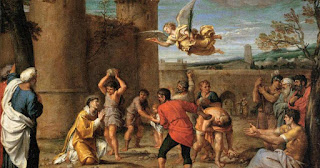Do Not Despair
How do we react when we come face to face with truth we don't want to hear?
This is the first of many questions that Acts 7:51-8:1a begs us to ask ourselves.
When Stephen tells the elders and the scribes that they are betrayers and murderers, Saul, the leader of the scribes and elders consents to Stephen being stoned to death. The elders, the scribes, and Saul react to the truth of Stephen’s words by continuing their betrayal of Christ and murderous actions.
But the reading gives us hope by begging us to contemplate and accept God's infinite mercy. Stephen's words of forgiveness while being stoned reflect the words of Christ during the crucifixion, “…Lord, do not hold this sin against them...” (Acts 7:60). We learn from Stephen's act of forgiveness during his death, and later from Saul's conversion, that God provides an abundance of grace. God not only forgives; he gives us the grace to forgive the seemingly unforgiveable.
The reading also gives us the hope that even if we do not immediately accept his grace and mend our ways, God will never stop offering his grace and forgiveness. No matter how late in life we come to him, he will be there, offering his mercy and love. If you continue to read beyond today’s scripture in the Acts of the Apostles, we hear that Saul, the leader who consented to having Stephen and many other followers of Christ condemned to death, is renamed Paul. As Paul, Saul becomes one of the most famous and influential disciples of Christ. He is so influential that he is named Saint Paul.
Today’s reading, which tells the story of Stephen’s martyrdom, shows us God’s infinite grace, mercy, and forgiveness. It not only reminds us of how we should react when the truth of our sins are revealed to us, it also shows us that we will receive the grace to forgive and be forgiven, no matter how dire or unforgiveable our sins may seem. It shows us that no matter how late in life we come to him, he will be ready to receive us. How hopeful is that? What a thing to celebrate and be joyful over!



Forgiveness in human form looks like the taking of punishment and pain away. Forgiveness in Christian doctrine is Jesus atoning for Adam. Forgiveness in the form of accepting God's will could be no longer living with the constriction and limit of what we understand and believe. Justice and fairness lose common meaning in the Eternal and Infinite. There is no great judge and possibly a great source and force of Being. This great source ask it demands that we give ourselves to its totality. This could be how we are released from error, mishap, and even willful sin. This is also how horrible things happen to good people. There is no order or pattern for us to understand. It is in that search for order that we impose our will over the will of all. Giving ourselves to the will of all is how we are free from all that confines us and then we are one with God. Freedom from sin is not like having a sentence commuted. It is more like being fully guilty of something and not defined by it thereby taking what form you once had and being reformed by no condition being placed on you and by such complete acceptance from something outside of yourself you find complete accceptance for yourself. Freedom from son comes with freedom from will and willingness to suspend all outcomes and accept that all is well. Gethsemane is the place we confess we want another outcome and are given the courage to see it through. Only by losing oneself can one find the true self that is one with the Father. It is me Ary.
ReplyDeleteIt was tough being a Christian back in those days. I think the problem today is that it.is harder to believe in Jesus immersed as we are in all this "progress" and technology. At the end of the essay, joy and hope are mentioned and without these factors, faith is not attainable. The peace of Christ be with you.
ReplyDelete